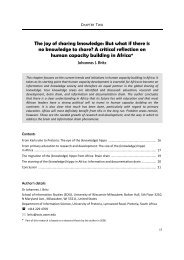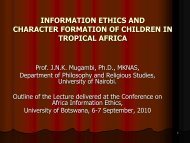Mutula, S.M. (2013). Ethical Dimensions of the <strong>Information</strong> Society: Implications for <strong>Africa</strong>. In <strong>Information</strong> <strong>Ethics</strong> <strong>in</strong> <strong>Africa</strong>:Cross-cutt<strong>in</strong>g Themes. Pretoria: ACEIE, 29-42.Chapter FourEthical Dimension of the <strong>Information</strong> Society: Implications for <strong>Africa</strong>Stephen M. MutulaSchool of Social Sciences, University of KwaZulu-Natal, SA1. Introduction<strong>Information</strong> <strong>Ethics</strong> (IE) concerns the responsible use of <strong>Information</strong> and Communication Technologies(ICTs) <strong>in</strong> the <strong>Information</strong> Society as enunciated by the World Summit of <strong>Information</strong> Society ActionL<strong>in</strong>e C10 (WSIS, 2005). The Internet, social media, computers and associated applications, such ase-Government and social network<strong>in</strong>g, are hav<strong>in</strong>g a tremendous impact on society. The laggardtechnological adoption behaviour that has characterised <strong>Africa</strong> and its people for many years isgradually be<strong>in</strong>g overcome <strong>in</strong> the wake of new technologies. New <strong>in</strong>formation and communicationtechnologies have quickly ga<strong>in</strong>ed acceptance and use <strong>in</strong> education, research, bus<strong>in</strong>ess, government,politics, professional practice and <strong>in</strong> the general society, which raises several ethical issues such as:protection of users’ rights; user privacy guarantees; methods of enforc<strong>in</strong>g compliance with thepolicies; user compensation when rights are violated; sanctions for errant users; verification of thecredibility of <strong>in</strong>formation uploaded by users; methods of conflict resolutions; roles and responsibilitiesof users; deal<strong>in</strong>g with cybercrime; user tra<strong>in</strong><strong>in</strong>g; deal<strong>in</strong>g with <strong>in</strong>tellectual property rights; guard<strong>in</strong>gservers aga<strong>in</strong>st <strong>in</strong>vasion and more. In <strong>Africa</strong>, cultural practices form part of the daily norms of thepeople and, consequently, the ethical issues concerned with the use of new technologies can neverbe over emphasised. In addition, <strong>Africa</strong> is endowed with people of diverse and heterogeneous norms,cultures, languages, religions, and governance systems that answer to different ethical and moral<strong>in</strong>terpretations. This environment has created <strong>in</strong>creased concerns about the moral and ethicalimplications for society, especially with regard to people’s legitimate rights. This chapter provides anattempt to address the responsible use of ICTs <strong>in</strong> the <strong>Information</strong> Society.Velasquez, Andre, Shanks, and Meyer (2010) state that ethics is not about somebody’sfeel<strong>in</strong>gs, one’s religious beliefs, or do<strong>in</strong>g what the law requires, or the standards of behaviour oursociety accepts. Instead, ethics refers to wellfounded standards of right and wrong that prescribe whathumans ought to do, usually <strong>in</strong> terms of rights, obligations, benefits to society, fairness, or specificvirtues. In this regard, ethics implies those standards that impose the reasonable obligations to refra<strong>in</strong>from rape, steal<strong>in</strong>g, murder, assault, slander, and fraud. In addition, ethical standards support virtuesof honesty, compassion, and loyalty; and the right to life, the right to freedom from <strong>in</strong>jury, and the rightto privacy. Fallis (2007) expla<strong>in</strong>s that the concept of ethics means dist<strong>in</strong>guish<strong>in</strong>g right actions fromwrong actions based on the premise that [right actions] have better outcomes. However, Fallis isquick to po<strong>in</strong>t out that there are ethical duties that human be<strong>in</strong>gs must obey, regardless of theoutcomes. The right th<strong>in</strong>g to do is determ<strong>in</strong>ed by the rights that human be<strong>in</strong>gs have, such as theuniversal human rights or the commonly held value system of persons, despite different moral orcultural backgrounds and <strong>in</strong>cl<strong>in</strong>ations. Carbo (2007) asserts that ethical conduct dictates that<strong>in</strong>dividuals should be treated with love, affection, k<strong>in</strong>dness, gentleness, generosity of spirit, and warmheartedness.While ethics is a concept that has come of age, <strong>Information</strong> <strong>Ethics</strong> is fairly new <strong>in</strong> literature,hav<strong>in</strong>g ga<strong>in</strong>ed prom<strong>in</strong>ence after the World Summit on <strong>Information</strong> Society (WSIS) <strong>in</strong> 2003 and 2005,respectively, as articulated <strong>in</strong> Action L<strong>in</strong>e C10 of the Plan of Action (WSIS, 2005).Page 29
S.M. MutulaBy def<strong>in</strong>ition, <strong>Information</strong> <strong>Ethics</strong> may be perceived as a branch of ethics which Chuang and Chen(1999) consider be<strong>in</strong>g a much larger philosophy known as social ethics. They consequently def<strong>in</strong>e<strong>Information</strong> <strong>Ethics</strong> as a discipl<strong>in</strong>e deal<strong>in</strong>g with the moral conduct of <strong>in</strong>formation users with respect totheir responsibility. The WSIS Action L<strong>in</strong>e C10 focuses on the ethical dimensions of the <strong>Information</strong>Society. This Action L<strong>in</strong>e holds that the <strong>Information</strong> Society should be subject to universally heldvalues and promote the common good, while prevent<strong>in</strong>g abusive uses of ICTs. Furthermore, the<strong>Information</strong> Society should take steps to promote respect for peace and to uphold the fundamentalvalues of freedom, equality, solidarity, tolerance, shared responsibility, and respect for nature. Inaddition, all actors <strong>in</strong> the <strong>Information</strong> Society should promote the common good, protect privacy andpersonal data and take appropriate actions and preventive measures, as determ<strong>in</strong>ed by law, aga<strong>in</strong>stabusive uses of ICTs for illegal and other acts such as racism; racial discrim<strong>in</strong>ation; xenophobia andrelated <strong>in</strong>tolerance; hatred; violence; all forms of child abuse, <strong>in</strong>clud<strong>in</strong>g paedophilia and childpornography; and traffick<strong>in</strong>g <strong>in</strong>, and exploitation of human be<strong>in</strong>gs (WSIS, 2005). Action L<strong>in</strong>e C8 of theWSIS Action Plan is also relevant, especially for <strong>Africa</strong>, as it focuses on cultural diversity and identity,l<strong>in</strong>guistic diversity, local content, traditions and religions. It also advocates for policies that support therespect, preservation, promotion and enhancement of cultural heritage as well as diverse forms ofdigital and traditional media (WSIS, 2005).2. Responsible use of ICTs <strong>in</strong> the <strong>Information</strong> SocietyCapurro (2008) underscores the value of <strong>Information</strong> <strong>Ethics</strong> <strong>in</strong> the <strong>Information</strong> Society <strong>in</strong> uphold<strong>in</strong>gthe fundamental values of freedom, equality, solidarity, tolerance, shared responsibility, respect fornature, peace, justice, dignity of human persons, and respect for human rights. He also highlights theimportance of fundamental freedoms of others <strong>in</strong>clud<strong>in</strong>g: personal privacy, the right to freedom ofthought, conscience and religion, <strong>in</strong> conformity with relevant <strong>in</strong>ternational <strong>in</strong>struments, and <strong>in</strong> ensur<strong>in</strong>gthat all actors <strong>in</strong> the <strong>Information</strong> Society take appropriate measures, as determ<strong>in</strong>ed by the law,aga<strong>in</strong>st abusive uses of ICT. Chuang and Chen (1999) note that the use of computers has creatednew problems, <strong>in</strong>volv<strong>in</strong>g cybercrime, unlawful acquisitions of private <strong>in</strong>formation and hack<strong>in</strong>g, thatmust be addressed.The abusive use of new technologies has <strong>in</strong>creased with the rapid spread of mobile phonesand social media worldwide, <strong>in</strong> general, and <strong>in</strong> <strong>Africa</strong> <strong>in</strong> particular, more than any other technologies,such as radio, television, Internet and computers, have <strong>in</strong> the past. The rapid spread of social media,for example, has raised several questions regard<strong>in</strong>g the protection of legitimate rights of the users.There are fears that <strong>in</strong>formation uploaded by users <strong>in</strong>to social media networks will be passed ontoother sources by service providers without their consent. Besides, there have been attempts byoverzealous governments and organisations to restrict access to social media, especially when theybelieve such new ICTs are be<strong>in</strong>g used for political agitation aga<strong>in</strong>st governments <strong>in</strong> power, as ithappened dur<strong>in</strong>g the Arab Spr<strong>in</strong>g. Rice (2011b) writes about other attempts to gag freedom ofexpression through a draft social-media policy at Sam Houston State University that was <strong>in</strong>tended toforce students with a campus-related Twitter, Facebook, or other onl<strong>in</strong>e account to give universityadm<strong>in</strong>istrators edit<strong>in</strong>g privileges. Elsewhere, Egyptian government officials <strong>in</strong> 2008 beat AhmedMaher Ibrahim, a 27-year-old civil eng<strong>in</strong>eer, for us<strong>in</strong>g Facebook to support calls for a general strike onMay 4 – President Mubarak’s 80th birthday. Lundsay (2010) therefore says new technologies,especially social media, if not well managed, open the door to numerous risks such as the breach ofconfidentiality, conflicts of <strong>in</strong>terest, and misuse of organisational resources.Late <strong>in</strong> 2011, the Hacktivist Group Anonymous threatened an imm<strong>in</strong>ent attack to br<strong>in</strong>g downFacebook. Hacktivists, who are ardent supporters of WikiLeaks, were target<strong>in</strong>g Facebook becausethe social network has often been at the centre of privacy concerns regard<strong>in</strong>g its users’ <strong>in</strong>formation.Hacktivist Group Anonymous, <strong>in</strong> a decoded voice <strong>in</strong> a YouTube video, noted that “everyth<strong>in</strong>g you doPage 30
- Page 1 and 2: Information Ethics in Africa: Cross
- Page 4: Information Ethics in Africa:Cross-
- Page 7 and 8: Page ii
- Page 9 and 10: Page iv
- Page 11 and 12: About the AuthorsDennis N. Ocholla
- Page 13 and 14: J.J. Britzmeaning of the ethical co
- Page 15 and 16: J.J. Britzright is not only on the
- Page 17 and 18: J.J. BritzFreeman, C. & Louca, F. (
- Page 19 and 20: R. Capurroprotection should be acco
- Page 21 and 22: R. Capurroindustrial and military a
- Page 23 and 24: R. Capurrocommon world instead of m
- Page 25 and 26: R. Capurroterminology (Wiredu, 1995
- Page 27 and 28: R. CapurroICT in Africa includes al
- Page 29 and 30: R. CapurroBuchmann, J. (Ed.) (2012)
- Page 31 and 32: R. CapurroRoosevelt, E. (1958). In
- Page 33 and 34: D.N. Ochollatheoretical views on th
- Page 35 and 36: D.N. Ochollaof GDP per capita are (
- Page 37 and 38: D.N. Ochollaassociate IK with tradi
- Page 39: D.N. Ochollafulfil the ideals as sp
- Page 43 and 44: S.M. Mutulasurpassing countries in
- Page 45 and 46: S.M. MutulaThe University of Manito
- Page 47 and 48: S.M. Mutula8. Gaps in social media
- Page 49 and 50: S.M. Mutulaadhering to policies and
- Page 51 and 52: S.M. MutulaIt was found that cultur
- Page 53 and 54: S.M. MutulaVelasquez, M., Andre, C.
- Page 55 and 56: D. KawooyaLikewise, the laws and re
- Page 57 and 58: D. Kawooya107) but slowly making it
- Page 59 and 60: D. Kawooya4. IP in Africa and ethic
- Page 61 and 62: D. Kawooyawrongdoing because of the
- Page 63 and 64: D. Kawooyapractices. Countries that
- Page 65 and 66: D. KawooyaOf course, at the core of
- Page 67 and 68: D. Kawooyanumber of information acc
- Page 69 and 70: Page 58
- Page 71 and 72: S.M. Mutulaparties and civil societ
- Page 73 and 74: S.M. Mutulaadoption of the principl
- Page 75 and 76: S.M. Mutulaset of 17 barriers for e
- Page 77 and 78: S.M. Mutulaavailing tender document
- Page 79 and 80: S.M. MutulaReferencesAkther, M.S.,
- Page 81 and 82: Page 70
- Page 83 and 84: J.J. Britzalso to benefit from it t
- Page 85 and 86: J.J. Britzthe public sphere, which
- Page 87 and 88: J.J. Britzinfrastructure, developme
- Page 89 and 90: J.J. Britz6.2. Qualitative indicato
- Page 91 and 92:
J.J. BritzSen, A. (1993). Capabilit
- Page 93 and 94:
IndexCapurro 1, 3, 4, 7, 11, 12, 21
- Page 95 and 96:
IndexFFacebook 30, 33fairness 2femi
- Page 97 and 98:
IndexITU World Telecommunication 27
- Page 99 and 100:
Indexrecognition algorithms 11recon
- Page 101:
IndexYYoruba 49YouTube 30ZZimbabwe






